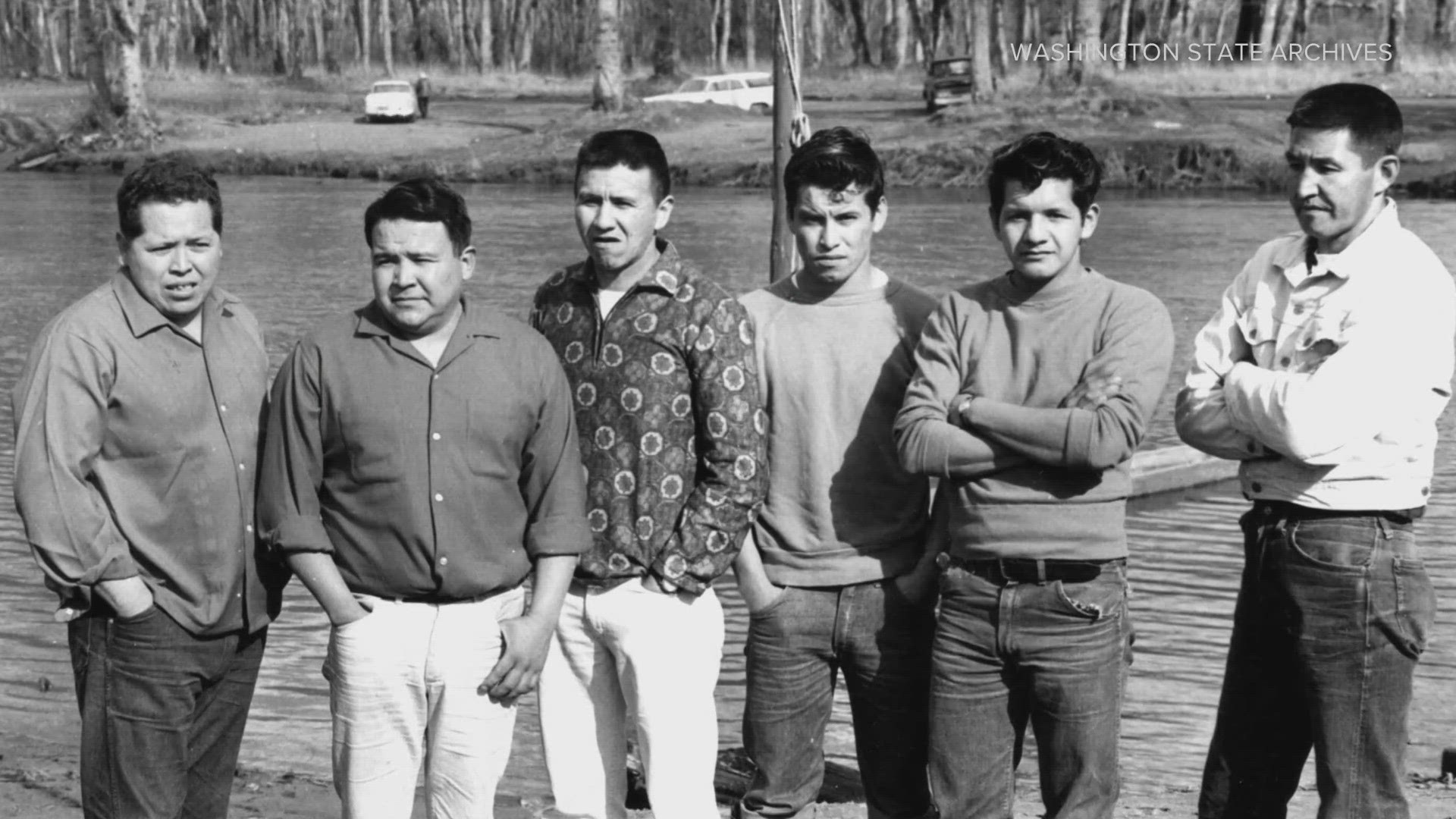NISQUALLY INDIAN COMMUNITY, Wash — More than 50 years later, the memories are still vivid for Dorian Sanchez.
As a teenager, Sanchez fished for salmon on the Nisqually River and nearly got arrested for doing it.
He recalls jumping out of his canoe into the swift, cold water, in the middle of the night, to avoid being caught by state game wardens.
“We were not going to jail,” Sanchez said.
But many of his friends, relatives, and fellow Nisqually tribal members were arrested and jailed during what was known as the "Fish Wars" in the 1960s and 1970s.
Police arrested Billy Frank, Jr., more than 50 times for fishing in Washington rivers, something he, and other tribal leaders, felt was guaranteed by treaties signed with the U.S. government in the 1850s.
On Feb. 12, 1974, federal court Judge George Boldt agreed, ruling Western Washington tribes had fishing rights for half of the state’s harvestable salmon population.
The Boldt Decision named tribes co-managers of the state’s fish population with the state of Washington.
At a two-day commemoration for the 50th anniversary last week, the Northwest Indian Fisheries Commission honored those who played roles in the decision.
Boldt’s daughter, Virginia, and grandson, Jeff Riedinger spoke during the event at the Muckleshoot Events Center.
“He would be pleased, but not surprised, that the tribes continue to take the lead in protecting salmon runs and demonstrating how to restore and sustainably manage those runs, and the streams, rivers, forests, and estuaries that are critical to a healthy salmon habitat," Riedinger said.
A different federal judge sentenced Wilbur Slockish, Jr., to three years in prison for fishing on the Columbia River.
Slockish, Jr., the traditional river chief of the Klickitat Band of the Yakama Nation, spoke during one of the panel discussions about being punished for catching salmon, something that was guaranteed by treaties.
”These fish were here," Slockish, Jr. said. "We took care of them. They took care of us."
Sanchez, now 75, went on to become Chairman of the Nisqually Tribe and had a chance to meet, and thank Justice Boldt personally.
”It was a great day,” Sanchez said. “It was big. It is still big.”
Sanchez said it is important future generations learn about the significance of the ruling.
”They need to understand that how we got here, to where we are today,” Sanchez said.
The Boldt Decision in 2024 and beyond
Monday marked 50 years since the Boldt Decision ensured treaty tribes half the harvestable catch in Washington waters, with the state and tribes co-managing the fishery.
Decades later, tribes and conservation experts said the challenge now is preserving salmon runs altogether, with many species at risk of extinction.
Lisa Wilson is the vice chair of the Northwest Indian Fisheries Commission and secretary of the Lummi Indian Business Council. Wilson said despite the Boldt decision, tribes still do not have adequate decision-making authority or funding.
"Right now, we're put in processes where our treaty rights are watered down and they're being diminished in those processes," Wilson said. "We just need to be brought back up to the level - supreme law of the land like we belong - we need to be co-managers of decisions, we need the resources that are brought to us and we need to cut the red tape so we can get to the work that needs to happen."
The state said pollution, habitat damage and environmental impacts such as climate change have all contributed to a decrease in salmon populations, and projects are underway to reverse some of those effects. State agencies including WSDOT are completing mandatory work to improve fish passage, a change that when done right can have excellent returns. Hatcheries are working to boost fish populations in areas where stock was depleted, and many other programs aim to improve environmental conditions for salmon.
But Wilson said work needs to happen faster, and tribes need streamlined permitting processes for habitat restoration, funding for hatcheries and a leadership seat at the federal and state tables.
"We know what needs to be done, but we just need that help to help ourselves," Wilson said. "We're not asking feds or state to come and do work. We're the ones actually doing the work. We just need that help to enable us to do what we need to do."
Leaders said getting the next generation involved is key. North Thurston Public Schools included a special focus on the Boldt Decision this year in conjunction with its "Since Time Immemorial" curriculum.
"Boldt is a powerful story about the importance of community and even as we live in contentious political times, what we see from it is not just something that benefitted tribes, but how communities coming together and finding resolutions," said Jerad Koepp, Native Student Program Specialist. "[It] creates a better future and healthy environment that our children will inherit and I hope that the work they get to see all these tribal and state leaders share over these two days inspires them to continue the work on in the future."
Students Greta Tuttle, Alice Bennett and Danika Francis shared their experiences at the Northwest Treaty Tribes' 'US v WA: 50th Anniversary' event.
"What was really interesting was learning about how they did fish-ins and how they protested against how they were stopping their rights," Tuttle said.

